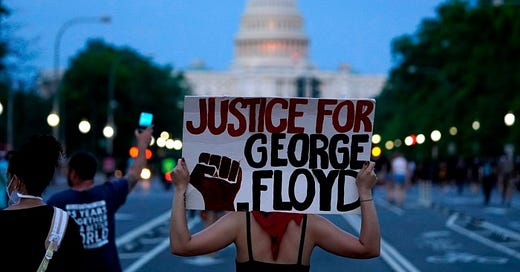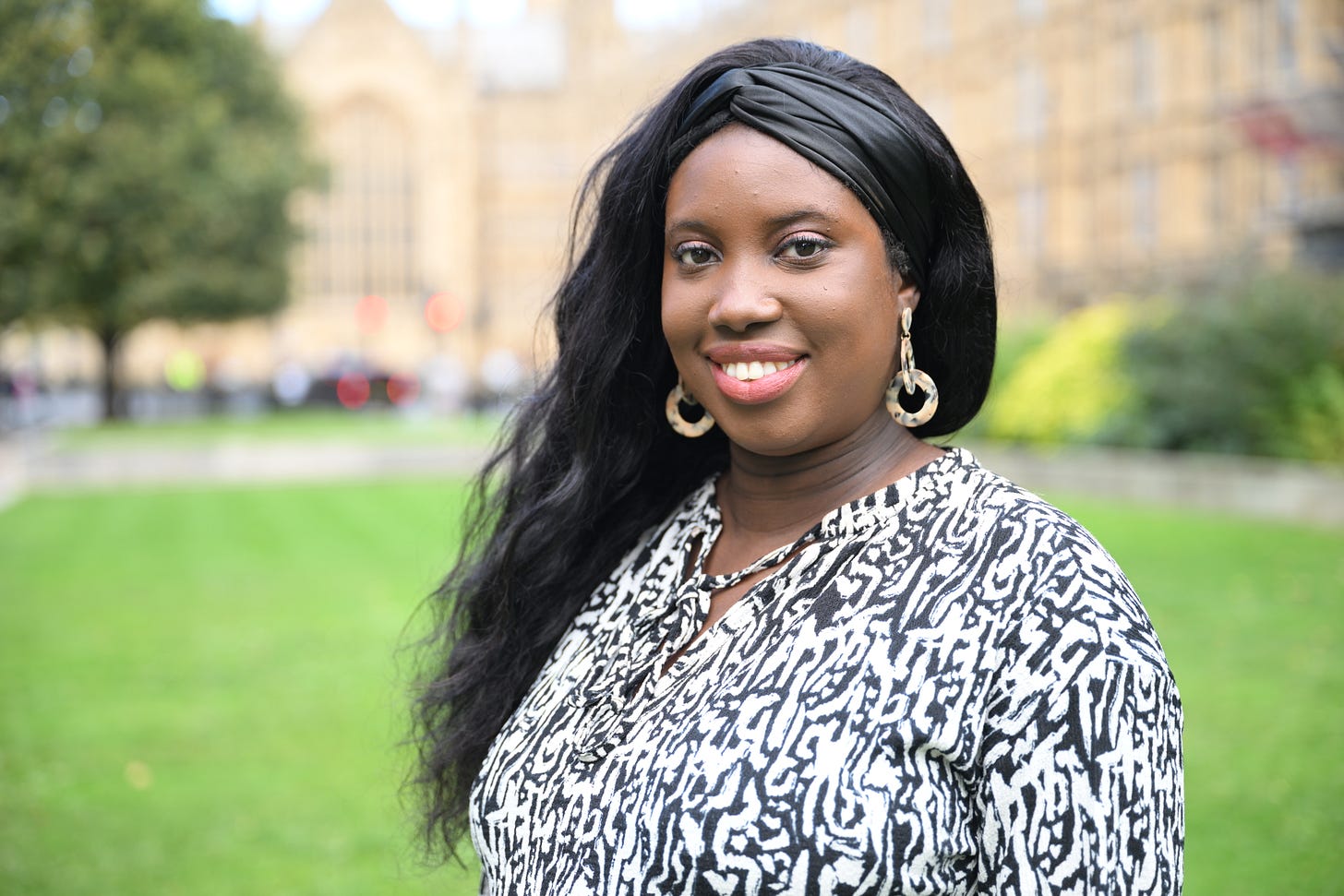BBC’s Backlash: The Murder of George Floyd – Review by Ada Akpala
This documentary avoids the real questions about race and society
⭐ (1-star)
This documentary marks the fifth anniversary of Floyd’s death. It presents itself as a sober, retrospective look at a moment that, we are told, changed the world. Few would deny that it did - but whether it changed the world for better or worse is where the real debate begins. The documentary positions itself as a thoughtful examination of race, justice, and social change. Yet what could have been a mature exploration of these topics is instead reduced to the same familiar moral narrative: systemic racism as an all-encompassing force, embedded in both American and British societies. I would give this documentary a 1 star rating.
The film presents a series of emotionally charged testimonies and familiar activist narratives, but avoids asking the deeper and more uncomfortable questions. For instance: what does it mean to import the American racial experience wholesale into a British context? Are the statistics and anecdotes presented representative or selective? Why are alternative voices - black British thinkers, sociologists, or critics of BLM - not given more airtime?
Perhaps most frustrating is the documentary’s treatment of the “Sewell Report” - the 2021 Commission on Race and Ethnic Disparities (CRED) publication that concluded the UK is not institutionally racist. Rather than engage with the report’s actual findings or the extensive evidence it presented, the film simply dismisses it as part of a reactionary backlash, and an attempt to "deny lived experience."
This reductionist reading does a disservice not only to the Sewell Report but to the wider public conversation about race in Britain. The report, whether one agrees with all its conclusions or not, offered a data-driven and more contextually grounded account of ethnic disparities. It acknowledged (constantly and clearly) that racism exists and continues to harm lives. But it also examined other factors such as geography, family structure, socioeconomic status, and educational attainment.
Yet to the ideologically attuned ear of the modern activist, any suggestion that disparities might have complex, multi-causal explanations is treated as heresy. In today’s moral landscape, if racism is not cast as the singular, overriding villain - the “big bad wolf” behind every outcome - then one is denying racism outright. This thinking is juvenile and lazy, and this documentary sadly adopts the same posture. It does not engage with the report's content, but instead caricatures it as a cynical political manoeuvre designed to delegitimise “the black experience.”
Preaching to the Converted
The most revealing aspect of Backlash is not what it includes, but what it avoids. There is no serious discussion of the consequences of BLM’s rise to prominence: the increase in polarisation, the public confusion over terms like “white privilege” and “systemic racism” and the rise of racial essentialism in society.
The only voice in the film that challenges the dominant narrative is Inaya Folarin Iman, director of The Equiano Project. Her inclusion is brief and somewhat isolated, and though she raises serious and legitimate points, the documentary makes no attempt to engage with these points further. Her appearance almost felt more like a gesture toward balance than a real invitation to consider alternative views.
Iman defends the Sewell Report, noting that it acknowledged the existence of racism while also highlighting other contributing factors behind disparities, such as class and family structure. She also voices concern about the way history is being rewritten, or in some cases, literally torn down, through actions like the toppling of statues. Specifically, she points to the removal of the Edward Colston statue in Bristol and suggests that these symbolic acts, often led by middle-class white protesters, can alienate the very people who might otherwise be sympathetic to the cause. Her argument is that these highly visible gestures can make the broader public less supportive, especially when they come across as self-righteous or disconnected from the everyday concerns of ordinary people.
There should have been more engagement with alternative ideas and perspectives. Figures such as Thomas Sowell, Glenn Loury, or even UK-based critics like Tony Sewell are entirely absent. In a film ostensibly about a backlash, the people who comprise that backlash are barely allowed to speak.
It’s also worth noting that this documentary is produced and distributed by the BBC, a publicly funded institution that is meant to serve a pluralistic audience. That it presents such a one-sided view of such a divisive and complex issue speaks volumes about the narrowing range of acceptable opinion in mainstream cultural spaces.
That said, some parts of the film were actually quite enlightening, particularly its spotlight on two cases of police violence in the UK, one resulting in a death and another leaving a man in a vegetative state. These are serious, troubling events, and the film is right to surface them. But even here, the presentation felt frustratingly black-and-white. Key contextual details were glossed over or omitted altogether in what seemed like a deliberate effort to still push a particular narrative.
Take the case of the man left in a vegetative state: the incident began at a nightclub and reportedly involved altercations with security staff before the police were called. Yet the documentary frames it, once again, as if a black man was merely “existing peacefully” until the police randomly intervened. This kind of selective storytelling often overlooks the basic fact that police do not appear out of nowhere—someone calls them. That doesn’t excuse excessive force or misconduct, but if we want to have a grown-up conversation about policing, public safety, and accountability, we need to be transparent about what actually happens in these situations. Only then can we begin to understand how escalation occurs, and what both the public and the police can do to reduce the chances of tragic outcomes.
Backlash had the opportunity to explore one of the most important cultural debates of the last decade with intellectual openness. It could have taken a step back, five years on from George Floyd’s death, and really scrutinised everything that followed—what changed, what didn’t, and what the consequences have been, both good and bad. Instead, it sticks to a same familiar script, as if the story is already settled.
That’s what makes Backlash such a frustrating watch: it clings to the same tired narrative, for example that only “white, far-right neo-Nazis” drove the backlash. In reality, many who pushed back were also ethnic minorities, unsettled by the movement’s trajectory. Others supported the core message of racial justice but rejected the ideological baggage that came with it. This documentary positions itself as morally self-evident and beyond challenge. It plays to an audience that already agrees. It avoids the harder, more uncomfortable questions - maybe because it knows the answers wouldn’t fit the perfect little story it’s trying to tell.
Backlash is available to watch on BBC iPlayer here.
Ada is the Head of Content at The Equiano Project. To support our work, consider becoming a free or paid subscriber.






Thank heavens there is the Equiano Project to provide a credible and legitimate voice to counter conceit of the BBC.
Well, I don't watch the BBC, and I probably wouldn't watch a George Floyd documentary, but I can easily image how awful this documentary is. When certain events take on a cult/ideological status the subsequent narrative is invariably built on fantasy, bias, ignorance and prejudice. Atleast by people who care little about actual facts.